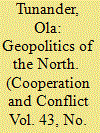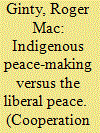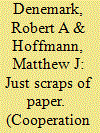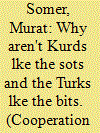|
|
|
Sort Order |
|
|
|
Items / Page
|
|
|
|
|
|
|
| Srl | Item |
| 1 |
ID:
082691


|
|
|
|
|
| Publication |
2008.
|
| Summary/Abstract |
After the Cold War, the Nordic states turned to the south, to the European Union. They established borderland regions to handle practicalities and relax the tension between east and west. Now, the Nordic states were free from Cold War bloc politics. The Nordic foreign policy elite amalgamated with Nordic constructivist scholars to reshape the political landscape of the North by re-inventing the pre-nation-state regional ties. However, the Nordic states also came to adapt to a new geometry of power, the Kjellénean power triangle. This return to Kjellénean geopolitics was not based on the power politics of the `US victory school', but, paradoxically enough, on European and Scandinavian relative weakness: a Geopolitik of the weak. Even more paradoxical, this return to geopolitics took place in Norway, Finland and to some extent in Denmark, not in Kjellén's home country of Sweden, i.e. as if the Swedish geopolitical taboo still made this impossible
|
|
|
|
|
|
|
|
|
|
|
|
|
|
|
|
| 2 |
ID:
082690


|
|
|
|
|
| Publication |
2008.
|
| Summary/Abstract |
Recent years have witnessed a resurgence of interest in indigenous, traditional and customary approaches to peace-making in the context of civil wars. Supporters claim that indigenous approaches to peacemaking are participatory and relationship-focused, and that peaceful outcomes have a higher chance of community adherence than template-style international peace interventions effected through the `liberal peace'. Using historical and contemporary examples, this article assesses the feasibility of a complementary relationship between customary and Western forms of peace-making. It posits that internationally supported peace operations (the liberal peace) are promoting a standardization of peace interventions in civil war situations that often fails to deliver a widely enjoyed peace. In some cases, traditional and indigenous approaches to peace-making and reconciliation can offer a corrective to the failings of the Western peace-making model. Yet, any temptation to romanticize `indigenous' and `traditional' peace-making must be resisted: instead, the concepts require careful conceptualization and interrogation. The article concludes that the structural power of Western peace-making methods limits the space for alternative approaches to peace-making and that rather than a co-existence of both forms of peace-making we are more likely to see the co-option of indigenous and traditional approaches by Western approaches.
|
|
|
|
|
|
|
|
|
|
|
|
|
|
|
|
| 3 |
ID:
082692


|
|
|
|
|
| Publication |
2008.
|
| Summary/Abstract |
Despite its importance in the global system, the literature provides little guidance on how treaty-making emerged as a well-accepted practice. In either assuming the appropriateness of treaty-making (and then analysing design) or treating treaties as strategic choices in the pursuit of gains (without analysing how treaties came to be a way to pursue gains), the current literature discounts the emergence and evolution of treaty-making. This lacuna contributes to a biased view of treaty-making as the epiphenomenal result of specific, ahistorical factors, rather than as a patterned, historical practice. We contend that the evolution of the practice of treaty-making is significant for questions of design/compliance, the future of multilateral interaction and global order. In addressing this concern, we pursue two linked goals. The first is self-consciously descriptive. We introduce a dataset of multilateral treaties that provides a novel picture of treaty-making across time, space and issue-areas. The second goal is explanatory. We develop and test a social constructivist and path-dependent explanation for the patterns of treaty-making evident in the data, especially 150 years of exponential growth, the spread of treaty-making across multiple issues and the diffusion of the practice across the world.
|
|
|
|
|
|
|
|
|
|
|
|
|
|
|
|
| 4 |
ID:
082693


|
|
|
|
|
| Publication |
2008.
|
| Summary/Abstract |
By modelling and analysing Turkey's Kurdish question in light of democratic transition theories, the Scottish Case and recent developments, this article explains the lack of cooperation between the `moderate' Turkish majority and Kurdish actors pursuing peace and European Union membership. It analyses whether there may be more cooperation in the near future and discusses implications for theories of political moderation. A `most different case', Scotland, helps in explaining the Turkish case and in avoiding mono-causal explanations based on cultural stereotypes. Among other factors and unlike the Scottish case, cooperation in the Turkish-Kurdish case is constrained by relations with Iraqi Kurds and the difficulty of identifying the moderates: Kurdish actors moderate in the sense of renouncing violence often make more hard-line political and conceptual claims than violent actors do. Theories need more multifaceted conceptualizations of moderation. The recent electoral success of the ruling political party and the presence of a Kurdish political party in Parliament may enable more moderate-moderate cooperation in the future. This will occur if potentially moderate actors can distance themselves from violence and choose conceptual and political compromise over coercion, and if Turkey, Iraqi-Kurds and the United States can reach an agreement on cooperation.
|
|
|
|
|
|
|
|
|
|
|
|
|
|
|
|
|
|
|
|
|